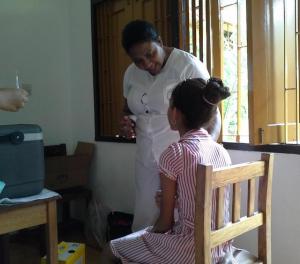HPV vaccine introduced into Seychelles routine immunization schedule
Seychelles has joined many other countries in the world in strengthening its efforts to prevent cervical cancer and other Human Papilloma Virus (HPV)-related diseases amongst its population. This is being done in an effort to reduce girls’ risk of developing HPV related cancers by as much as 80%. Since May 2014, the Ministry of Health has introduced the HPV vaccine into its routine immunization schedule.
During a colourful landmark ceremony to mark African Vaccination week in April 2014, the Minister for Health Mrs Mitcy Larue officially launched HPV vaccine into the country’s routine immunisation schedule at the Ile Perseverance School . This happened in the presence of the former World Health Organisation (WHO) Liaison Officer, Dr. Cornelia Atsyor, senior management of the Ministry of Health and the Ministry of Education, Members of the Parliament, parents and students. Since then, eligible P6 school girls in the country have been vaccinated with the HPV vaccine within the school setting.
Introduction of HPV vaccine follows recommendations from WHO’s Strategic Group of Experts (SAGE) on vaccines and immunization who endorsed a position paper on vaccines against diseases caused by HPVs in 2006. HPV infections are primarily transmitted by sexual contact and highly transmissible. During one’s life course, most sexually active men and women will acquire an HPV infection. Although most HPV infections are transient and benign, persistent genital infection with certain types can lead to warts and cancers of the cervix, vagina, penis and anus, amongst others. Countries with well-organized programmes to prevent, detect and treat precancerous abnormalities can prevent up to 80% of these cancers. Currently, the two HPV vaccines available on the market are designed for prophylactic use, meaning to prevent HPV related diseases. These vaccines are most efficacious in females who are naïve to vaccine-related HPV types, therefore the primary target population are girls who have not yet engaged in sexual activity.
With these knowledge, since 2006, WHO has recognized the importance of HPV-related diseases as global public health problems and has recommended that routine HPV vaccination be included in national immunization programmes, where prevention of cervical cancer constitutes a public health priority and where vaccine introduction is programmatically feasible, sustainable and cost effective.
With the support of the WHO, technical assistance was provided for the training of EPI and School Health nurses as well as to conduct the post introduction evaluation which took place in December 2014. The Expanded Programme on Immunisation is happy that the uptake of the HPV vaccine in the country has increased from 76% in 2014 to 86% in 2016.
_______________________________________________________
For more information, please contact:
Doreen Hotive (Mrs), NPO/HIP Officer, Tel: (248) 4224795, Fax: (248) 225754, Email: hotived [at] who.int (hotived[at]who[dot]int)



